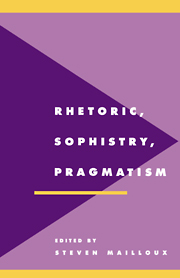Book contents
- Frontmatter
- Contents
- List of contributors
- Acknowledgements
- Introduction: sophistry and rhetorical pragmatism
- 1 Isocrates' philosophia and contemporary pragmatism
- 2 The degradation of rhetoric; or, dressing like a gentleman, speaking like a scholar
- 3 Antilogies, dialogics, and sophistic social psychology: Michael Billig's reinvention of Bakhtin from Protagorean rhetoric
- 4 The “genealogies” of pragmatism
- 5 Philosophy in the “new” rhetoric, rhetoric in the “new” philosophy
- 6 Individual feeling and universal validity
- 7 Pragmatism, rhetoric, and The American Scene
- 8 The political consequences of pragmatism; or, cultural pragmatics for a cybernetic revolution
- 9 In excess: radical extensions of neopragmatism
- Selected bibliographies
- Index
9 - In excess: radical extensions of neopragmatism
Published online by Cambridge University Press: 03 December 2009
- Frontmatter
- Contents
- List of contributors
- Acknowledgements
- Introduction: sophistry and rhetorical pragmatism
- 1 Isocrates' philosophia and contemporary pragmatism
- 2 The degradation of rhetoric; or, dressing like a gentleman, speaking like a scholar
- 3 Antilogies, dialogics, and sophistic social psychology: Michael Billig's reinvention of Bakhtin from Protagorean rhetoric
- 4 The “genealogies” of pragmatism
- 5 Philosophy in the “new” rhetoric, rhetoric in the “new” philosophy
- 6 Individual feeling and universal validity
- 7 Pragmatism, rhetoric, and The American Scene
- 8 The political consequences of pragmatism; or, cultural pragmatics for a cybernetic revolution
- 9 In excess: radical extensions of neopragmatism
- Selected bibliographies
- Index
Summary
In his genealogy of pragmatism, Cornel West traces this twentiethcentury American philosophy back to its “prehistory” in Emerson, who asserts the “primacy of power-laden people's opinion (doxa) over value-free philosophers' knowledge (episteme).” Though elements of rhetoric were present in the philosophies of Emerson, James, and Dewey, perhaps the distinguishing feature of pragmatism's revival is an even more direct reference to rhetoric's centuries-old challenge to classical philosophy. Richard Rorty's neopragmatism reintroduces the classical opposition between rhetoric and philosophy, where rhetoric stands for contingency and persuasion in contrast to universality and Truth. Rorty's anti-foundationalism has effected an institutional disruption of Anglo-American philosophy, knocking the props out from under the mainstays of analytic tradition: the correspondence theory of truth, privileged representations, and the self-reflective transcendental subject. Neopragmatism introduces the linguistic turn of continental philosophy since Nietzsche into the Anglo-American tradition, interrupting its universalist monologue with the news that philosophizing is like a conversion.
Neopragmatism has had institutional effects not only in the discipline of philosophy but also in literary studies, where its rhetorical resonances have made a new kind of sense in the debates over theory. Inspired by Rorty's anti-foundationalism, literary critics like Steven Knapp, Walter Benn Michaels, and Stanley Fish have argued for the undoing of Theory as a self-sustaining discourse that can guarantee the outcomes of its practices. This version of anti-foundationalism, when carried to its logical extension within the realm of theory itself, leads its adherents to a renunciation of theories tout court.
- Type
- Chapter
- Information
- Rhetoric, Sophistry, Pragmatism , pp. 206 - 227Publisher: Cambridge University PressPrint publication year: 1995
- 2
- Cited by



